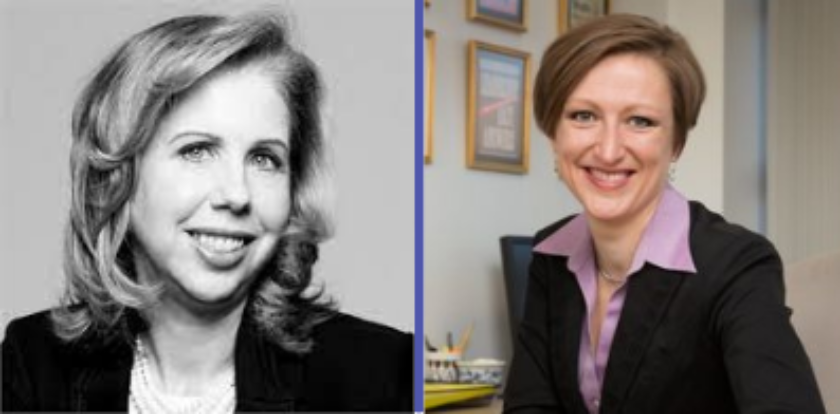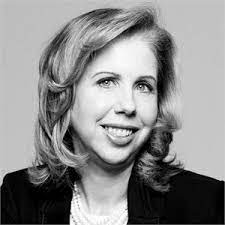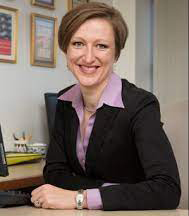
Civic Science Sparks With … The Shorenstein Center on Media, Politics and Public Policy
April 27, 2022
Two top communications experts in their respective fields are making important headway on an existential question facing democracies around the world: How do we get people who have different attitudes, different beliefs, and fundamentally different perceptions of what’s true and what’s false to have thoughtful, engaged conversations about their points of view?
With their powers combined, Nancy Gibbs—Director of the Shorenstein Center and Edward R. Murrow Professor of the Practice of Press, Politics, and Public Policy and a Civic Science Fellows host partner—and Julia Minson—a Shorenstein Center Civic Science Fellow and Associate Professor of Public Policy at the Harvard Kennedy School of Government—are collaborating on a project focused on understanding the conditions that make people willing to listen and be receptive to views they strongly oppose on science-related political and social issues.
A scholar and expert in political journalism, Nancy has made a career out of spotlighting the intersection of power and politics throughout modern American history. A former Editor in Chief of TIME—the first woman to hold the position—Nancy wrote more cover stories than any other author in the magazine’s history. She has also co-written two best-selling books on presidential histories. Julia, a decision scientist, heads the Minson Conflict and Collaborating Lab, where she researches the most effective tactics for building bridges among opposing viewpoints.
Now, against the backdrop of the war in Ukraine, Julia is testing her research in real time. Born in Russia with family members in Ukraine, Julia has partnered with a global email campaign to reach Russian citizens with facts about the war in an attempt to “pop the propaganda bubble.”
Rita Allen Foundation President and CEO Elizabeth Christopherson reached out to Nancy and Julia for their insights on the relationship between their fields of study and civic science, and they each provided a compelling perspective on just how connected our work must be to find the solutions we need now.
Nancy Gibbs, Director of the Shorenstein Center and Edward R. Murrow Professor of the Practice of Press, Politics, and Public Policy

Most journalists, whether they admit it or know, like it or not, are also educators. They may identify more with detectives or lifeguards or trapeze artists, but in the end the public mission of the press is to seek out, collect and transmit information to those who need it.
So as a journalist, I’ve thought about how we balance what is interesting with what is important, how we make complicated things comprehensible, how we help people understand the forces that are shaping their lives, their families, their work, their communities. And when it comes to many of the crucial issues of our day, whether the challenge of climate or advances in biotech or threats from cybersecurity or the possibilities of artificial intelligence, journalists have to be translators as well as transmitters. This is where civic science becomes so critically important.
As society faces ever harder questions about the practical and ethical implications of new inventions, new technologies, we need to find a way to open up the conversation and debate beyond the elite innovators who are driving change. But it’s hard to discuss or debate things you don’t understand. How can we bring scientists into community with humanists, speak to head and heart, left brain and right, to the practical and the theoretical? When we think about human progress, how do we pave roads for speed but erect guardrails for safety? Who is in the best position to dispassionately weigh competing values? With the truly extraordinary advances in science we see every day, how do we balance hope with humility?
Newsrooms, where I spent most of my career, are chaotic places where people compete for attention, argue that their topic, their story is most important and deserves the front page, the lead of the evening news. We are constantly assessing where the public interest and appetite lies. And very often, the stories that are most compelling occur at intersections, the business of sports, or the ethics of medicine, or the art of invention. The Civic Science Fellows program creates a special opportunity for people to go exploring outside their normal area of focus and look for connections, new insights, and deeper understanding. And that broad connection can lead to new kinds of collaboration, new partnerships, and new avenues of inquiry. Ultimately, this is what both science and civics are all about.
Julia Minson, 2021 Shorenstein Center Civic Science Fellow and Associate Professor of Public Policy at the Harvard Kennedy School of Government

My discipline, social psychology, has historically held civic science as one of its fundamental values. From the origins of the field in the post World War II period, psychologists have sought to understand how people resist abusive authority, make choices for the good of the community, embrace (or fail to embrace) diversity, and organize themselves for collective action. Traditional social psychology was a civic science before civic science was cool. Over time, the field tried to become a “basic science.” Psychologists tried to take on the norms and values of physicists and biologists, spawning a debate about the “fundamental” versus “applied” research. My own training at Stanford, however, was always steeped in the classic tradition that explicitly embraced the use of the scientific method to solve real problems. Those values were deeply ingrained in me by my mentors and the desire to use research to make the world a better place (not just a better understood place), is what motivates me to get out of bed every morning.
My own research examines the communication strategies people can use to have thoughtful, engaged conversations with holders of opposing views. During my Civic Science Fellowship, I have been conducting experiments to test the use of a set of tools we call “conversational receptiveness” for overcoming vaccine hesitancy. This work is inherently interdisciplinary, requiring collaboration with colleagues in medical education and public health. The Fellowship exposed me to a network of scholars who were able to provide me with the resources to move the project forward. Thanks to an introduction made by another Civic Science Fellow, I am now starting a large-scale clinical trial in collaboration with the Emergency Department at the Boston Medical Center to test our intervention in the field and learn whether “conversational receptiveness” can increase vaccination rates among some of Boston’s most underserved residents. The horrific war in Ukraine prompted me to also consider how my research can be applied in that context. With the support of the Shorenstein Center, I have gotten involved in an international initiative called Mail2RU to send anti-war messaging and independent news to the people of Russia. For someone who was born in Russia and with many Ukrainian relatives, this work has been heartbreaking. But it also reaffirms to me the value of civic science. Researchers cannot stand on the sidelines and stick to basic research. We have a responsibility to apply what we know now, to the problems that are happening now. The level of international support and engagement that the mail2ru project has generated made me realize that the world is full of well-meaning people who want to help solve our many crises, and what they need is leadership and research-backed guidance on how to apply their energy. I am fortunate to be in an academic institution that values engagement with real-world problems and to have the support of the Civic Science Fellows program in this endeavor. I hope that more of my fellow researchers and leaders of academic departments recognize the tremendous set of resources that social scientists can offer to addressing global challenges and find more avenues for all of us to get involved.
“We’re still in the midst of a pandemic due in no small part to another disease: people can’t or won’t change their minds—even when the stakes are high. Julia’s interdisciplinary work is shedding new light on perhaps the key challenge for the 21st century: how to get people who disagree to come together.”
—Sam Gill, President and CEO, Doris Duke Charitable Foundation
Shorenstein Civic Science Fellow Julia Minson is supported by the Rita Allen Foundation and the Doris Duke Charitable Foundation.